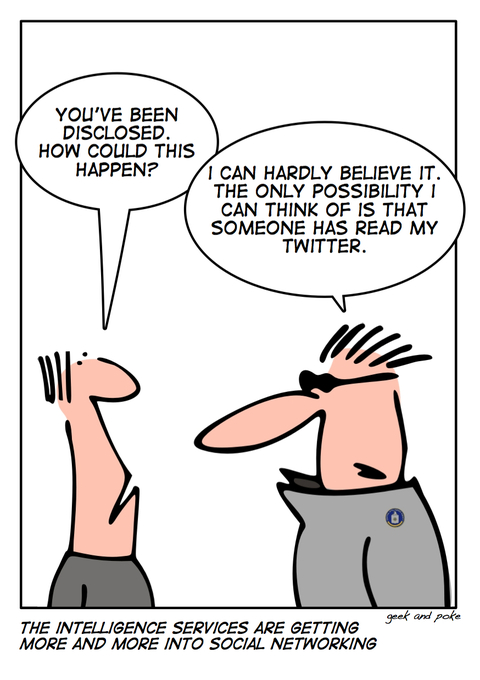
Geek and Poke, August 22, 2007.
Used with permission. CC 2.0 DE.
Why should you dive in to social media sites like Facebook, Twitter, SlideShare, IntenseDebate, and Posterous? Is it worth the time and effort to understand the tools and what each is for?
Discussions about the benefits and challenges of social media services continue. Productivity tool? Time suck? Network developer? Spam factory? One thing is rarely argued: longevity. We dont hear many claiming it's a passing fad anymore. The services are here to stay.
The discussion is a hot one because the Web is young. Fifteen years ago it was barely emerging from dark server rooms where geeks still wore pocket protectors. It's no wonder that the rapidly shifting landscape is still met with suspicion and hesitancy.
But compare this to the emergence of the telephone. How did consumers receive it when it was first invented? Does the telephone aid or hinder productivity?
Yes, it does aid or hinder productivity. It depends on who's using it, and how.
I happen to be one of those people who doesn't like the telephone. I think it's inefficient, annoying, and archaic, both technologically and socially. But there are plenty to disagree with me. And they'll add that fax machines and DSL still run over the hundred-year old copper wire system the telephone (and its ugly cousin, the telegraph) created. They have a point.
(I've even seen a demo of DSL running over rusty Soviet barbed wire. I'm not kidding. That copper infrastructure still has some life left in it.)
So what's the buzz in social media? It's a potpourri of spam congestion, egocentric inanity, triviality, and substance. Just like what we hear on the telephone!
You ever get asked in an interview if you know how to use a telephone? Didn't think so. People just assume that one. But employers now are divided in three camps on social media tools: they're indifferent to them, they really want you to use them, or they really want you NOT to use them.
This post doesn't necessarily apply to anyone working for a company in the latter group. If that's you, I don't recommend that you circumvent your employer's Internet controls. Following HR rules is a good method for maintaining job security.
But if you're in one of the first two categories, here are some reasons why you SHOULD be a pathfinder, a trendsetter, and a resource to your company or group.
- Social networking increases your knowledge and awareness. You find out what's going on, faster than news services. You can respond faster to emerging trends and activity.
- Social networking increases collaboration. What began thirty years ago with an eletist amateur intelligensia dialing a few 1200 baud modems into homebrew Bulletin Board Systems is now a transparent, open forum full of global interactivity and altruistic intentions.
- Social networking generates new business and personal relationships. Our value grows when people need us. It also grows when people need us to know who we need.
- Social networking shares openly and freely.
- Social networking gets your message out to your existing friends, family, and business network fast. Your call for help or your offer of help, your good news or your bad, your influence and your openness to influence are all public faster than messages used to travel on airwaves.
- Social networking (done right) promotes your reputation and gives you a chance to promote the reputation of others. You scratch a lot of backs. And grateful people return favors.
- Social networking gets you noticed. Fast.
- Social networking blurs lines between opportunism and leadership. What's the difference between "selling" and "talking to your friends about what you do" anymore? Social networking gets your friends aware of your career, and your customers and managers interested in your personality.
- Social networking openly shares new ideas. Because of the conversation it inherently generates, it openly identifies bad ones, too.
- Social networking increases your value to your current and subsequent employers. (That's good for your instant gratification based ego, too.)
- Social networking reveals fascinating connections between seemingly unrelated ideas, people, and movements.
The final reason is purely pragmatic. Social networking is being used by others to create contacts, to share knowledge, to build relationships with human beings. Anyone who is coasting through progress and avoiding new tools and technologies while their competitors grow AND use these tools to their benefit is about to face a rude awakening.
Free tools are available, and capitalizing on "free" is always wise.
Questions:
- Why do you use social media? How has it benefitted you?
- Which services have you found most useful? Which ones do you think should disappear?
- Or, why are you holding back from engaging in social media? What are your concerns?